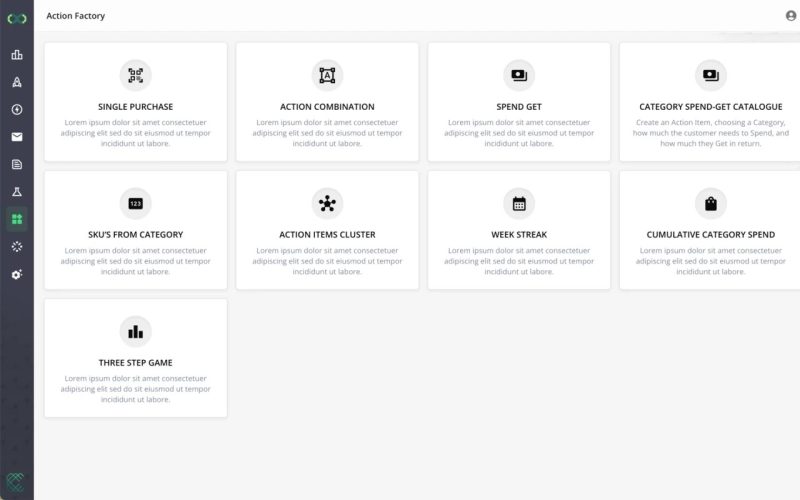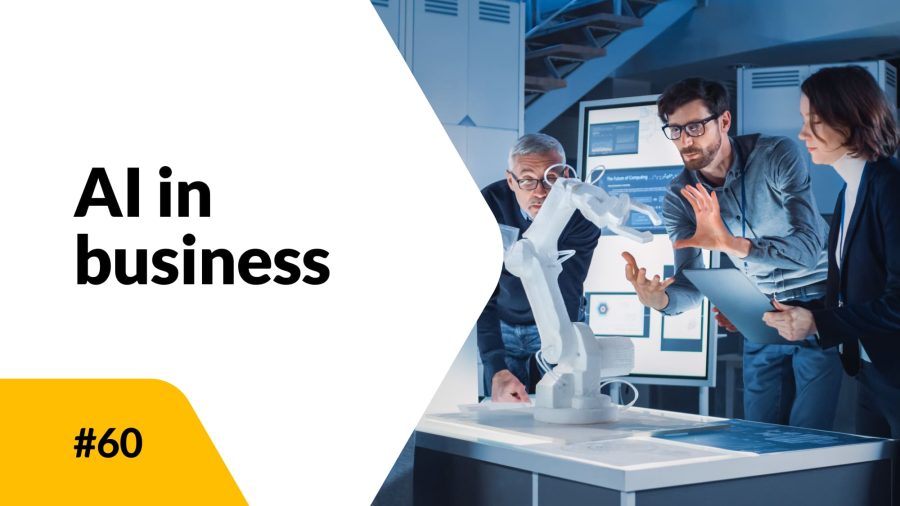B2B personalization – table of contents:
- How to write a good B2B personalization offer?
- The role of artificial intelligence in B2B personalization
- Benefits of using artificial intelligence to personalize B2B offers
- Practical applications of AI in B2B personalization
- Challenges of using AI in B2B personalization
- Trends and future of artificial intelligence in B2B personalization
- Summary
How to write a good B2B personalization offer?
B2B offers are aimed at other companies or businesses rather than individual customers. They can be about selling products or services, outsourcing, or consulting. To create an effective and engaging offer for a business customer, it is useful to follow a few rules:
- Use simple, easy-to-understand language – avoid industry jargon and complicated wording to make the content clear to any customer,
- Bet on specifics and numbers — provide hard data to back up the benefits, for example, how much can be saved or gained with your service. This will let you avoid unmeasurable generalities,
- Write from the customer’s perspective — focus on the benefits a specific business will get thanks to your solution. Answer the question: “Why is this offer attractive to my company?”
- Match form and tone — email, presentation, or phone call – each communication channel may require a slightly different style to achieve the desired effectiveness, and finally,
- Personalize — if possible, add elements that are personalized to the specific customer, showing that you know them well.
To personalize B2B offers, we need to have the right data about the customer. What industry do they operate in, how many years have they been on the market, and at what stage of development is their company? The list of questions here depends not only on the specifics of the services or products offered but also on the possibility of obtaining them.
The role of artificial intelligence in B2B personalization
Artificial intelligence lets you personalize B2B offers in several ways. The starting point, however, is always customer data. But what if the only source of information about the customer is the invoice? Even basic data can be a great way to start Account Based Marketing (ABM). If you don’t have an extensive database, consider building one. The more information you can get about your target audience, the better the B2B personalization results will be.
First, AI identifies customer preferences and behavioral patterns by automatically analyzing customer data. For example, the AI system can track a particular customer’s purchase history to identify the most frequently ordered products and make a personalized discount offer.
This can be done by leveraging information gathered by the sales team, who interact directly with buyers. Dedicated customer relationship management (CRM) platforms will work well here – including those that use AI to automatically transcribe conversations. These will allow you to capture data on who and what you’re talking to during a particular conversation, as well as what purchase is being discussed.
Another key functionality of AI is generating tailored service recommendations. Based on the collected data, artificial intelligence helps prepare a personalized B2B offer, precisely indicating the most suitable options for the customer.
AI is also useful for creating dynamic, personalized content as part of the offers sent to customers. It tailors the message to the defined preferences and interests of the recipient, increasing the attractiveness and relevance of the prepared offer. For example, Fabriq, a tool developed by the Boston Consulting Group (BCG) can work with any digital personalization system or platform via an API. It comes with a rich library of B2B offer templates.

Source: BCG ((https://www.bcg.com/beyond-consulting/bcg-gamma/fabriq)
In addition, AI enables precise segmentation of the customer base and targeted sales activities. AI systems analyze customers’ buying behavior, segment them into groups, and then target them with personalized marketing communications.
Finally, artificial intelligence can revolutionize the entire shopping experience for business customers. By integrating with CRM and e-commerce platforms, it creates personalized customer journeys and delivers tailored recommendations and solutions at every step.
Benefits of using artificial intelligence to personalize B2B offers
Employing AI brings several benefits. The most tangible of these are:
- Increased conversions – more relevant, tailored offers translate into more sales,
- Increased loyalty – customers appreciate that the company is learning about their needs, so they stay with the company longer,
- Lower costs – automating marketing and sales activities, such as the use of chatbots, means lower operating costs,
- Reaching decision makers faster – using AI to personalize B2B offers means better, more precise targeting.
Practical applications of AI in B2B personalization
Specific examples of how AI can be used to personalize B2B offerings are primarily:
- Generating personalized content in emails – it’s not just about using first names, it’s about taking into account the real needs and interests of customers,
- Automatically selecting products and services that match a particular customer’s profile, such as those displayed in your online store’s search window,
- Suggesting additional options or features based on the customer’s purchase history,
- Analyzing customer sentiment in conversations to improve service.

Source: DALL·E 3, prompt: Marta M. Kania (https://www.linkedin.com/in/martamatyldakania/)
Challenges of using AI in B2B personalization
Implementing AI also presents many challenges. The most important of these is the need to capture and integrate customer data from multiple sources, such as CRM, website analytics, and social media. This is where tools like Salesforce and Hubspot come into play.
However, collecting and organizing data is not enough. The company must also develop effective, repeatable processes that use artificial intelligence to create personalized B2B offers. This will also require:
- training employees in the use of AI technology,
- ensuring compliance with personal data security standards such as GDPR, and
- verifying the accuracy of the content of offers automatically generated by AI algorithms.
It is important to remember that artificial intelligence can support the process of creating personalized B2B offers. However, the responsibility for the content sent to customers rests with humans. Therefore, to avoid errors and misunderstandings, it is crucial to thoroughly test the implemented processes, monitor their performance, and – at least randomly – check the correctness of the generated content.
It can also be a challenge to get some of the more conservative customers to accept AI-driven solutions. Therefore, the decision to implement AI-powered B2B personalization must be based on in-depth knowledge of the target audience.
Trends and future of artificial intelligence in B2B personalization
According to McKinsey analysts, 71% of customers already expect personalized interactions from companies, and 76% are frustrated when it doesn’t happen. Soon, the lack of a personalized offer will mean unpleasant surprises for every customer. As a result, experts predict that the evolution of AI in B2B personalization will go in the following directions:
- The development of voice assistants and chatbots that communicate directly with the customer – thanks to them, the B2B customer will get a personal shopping advisor who will provide a personalized offer,
- Using algorithms to analyze customer emotions expressed in conversations or emails – sentiment analysis in writing and speech is already highly developed and will be widely used in consumer solutions in the coming years,
- In-depth, multidimensional segmentation of the customer base using AI models – allowing for hyperpersonalization.
It will also be possible to include not only the customer’s company data but also the preferences of their employees.
B2B personalization – summary
AI offers great potential for personalizing offers and communicating with business customers. Thanks to automation based on artificial intelligence, companies can better understand and more accurately respond to customer needs. This builds lasting business relationships, loyalty, and customer satisfaction.

If you like our content, join our busy bees community on Facebook, Twitter, LinkedIn, Instagram, YouTube, Pinterest, TikTok.
Author: Robert Whitney
JavaScript expert and instructor who coaches IT departments. His main goal is to up-level team productivity by teaching others how to effectively cooperate while coding.
AI in business:
- Threats and opportunities of AI in business (part 1)
- Threats and opportunities of AI in business (part 2)
- AI applications in business - overview
- AI-assisted text chatbots
- Business NLP today and tomorrow
- The role of AI in business decision-making
- Scheduling social media posts. How can AI help?
- Automated social media posts
- New services and products operating with AI
- What are the weaknesses of my business idea? A brainstorming session with ChatGPT
- Using ChatGPT in business
- Synthetic actors. Top 3 AI video generators
- 3 useful AI graphic design tools. Generative AI in business
- 3 awesome AI writers you must try out today
- Exploring the power of AI in music creation
- Navigating new business opportunities with ChatGPT-4
- AI tools for the manager
- 6 awesome ChatGTP plugins that will make your life easier
- 3 grafików AI. Generatywna sztuczna inteligencja dla biznesu
- What is the future of AI according to McKinsey Global Institute?
- Artificial intelligence in business - Introduction
- What is NLP, or natural language processing in business
- Automatic document processing
- Google Translate vs DeepL. 5 applications of machine translation for business
- The operation and business applications of voicebots
- Virtual assistant technology, or how to talk to AI?
- What is Business Intelligence?
- Will artificial intelligence replace business analysts?
- How can artificial intelligence help with BPM?
- AI and social media – what do they say about us?
- Artificial intelligence in content management
- Creative AI of today and tomorrow
- Multimodal AI and its applications in business
- New interactions. How is AI changing the way we operate devices?
- RPA and APIs in a digital company
- The future job market and upcoming professions
- AI in EdTech. 3 examples of companies that used the potential of artificial intelligence
- Artificial intelligence and the environment. 3 AI solutions to help you build a sustainable business
- AI content detectors. Are they worth it?
- ChatGPT vs Bard vs Bing. Which AI chatbot is leading the race?
- Is chatbot AI a competitor to Google search?
- Effective ChatGPT Prompts for HR and Recruitment
- Prompt engineering. What does a prompt engineer do?
- AI Mockup generator. Top 4 tools
- AI and what else? Top technology trends for business in 2024
- AI and business ethics. Why you should invest in ethical solutions
- Meta AI. What should you know about Facebook and Instagram's AI-supported features?
- AI regulation. What do you need to know as an entrepreneur?
- 5 new uses of AI in business
- AI products and projects - how are they different from others?
- AI-assisted process automation. Where to start?
- How do you match an AI solution to a business problem?
- AI as an expert on your team
- AI team vs. division of roles
- How to choose a career field in AI?
- Is it always worth it to add artificial intelligence to the product development process?
- AI in HR: How recruitment automation affects HR and team development
- 6 most interesting AI tools in 2023
- 6 biggest business mishaps caused by AI
- What is the company's AI maturity analysis?
- AI for B2B personalization
- ChatGPT use cases. 18 examples of how to improve your business with ChatGPT in 2024
- Microlearning. A quick way to get new skills
- The most interesting AI implementations in companies in 2024
- What do artificial intelligence specialists do?
- What challenges does the AI project bring?
- Top 8 AI tools for business in 2024
- AI in CRM. What does AI change in CRM tools?
- The UE AI Act. How does Europe regulate the use of artificial intelligence
- Sora. How will realistic videos from OpenAI change business?
- Top 7 AI website builders
- No-code tools and AI innovations
- How much does using AI increase the productivity of your team?
- How to use ChatGTP for market research?
- How to broaden the reach of your AI marketing campaign?
- "We are all developers". How can citizen developers help your company?
- AI in transportation and logistics
- What business pain points can AI fix?
- Artificial intelligence in the media
- AI in banking and finance. Stripe, Monzo, and Grab
- AI in the travel industry
- How AI is fostering the birth of new technologies
- The revolution of AI in social media
- AI in e-commerce. Overview of global leaders
- Top 4 AI image creation tools
- Top 5 AI tools for data analysis
- AI strategy in your company - how to build it?
- Best AI courses – 6 awesome recommendations
- Optimizing social media listening with AI tools
- IoT + AI, or how to reduce energy costs in a company
- AI in logistics. 5 best tools
- GPT Store – an overview of the most interesting GPTs for business
- LLM, GPT, RAG... What do AI acronyms mean?
- AI robots – the future or present of business?
- What is the cost of implementing AI in a company?
- How can AI help in a freelancer’s career?
- Automating work and increasing productivity. A guide to AI for freelancers
- AI for startups – best tools
- Building a website with AI
- OpenAI, Midjourney, Anthropic, Hugging Face. Who is who in the world of AI?
- Eleven Labs and what else? The most promising AI startups
- Synthetic data and its importance for the development of your business
- Top AI search engines. Where to look for AI tools?
- Video AI. The latest AI video generators
- AI for managers. How AI can make your job easier
- What’s new in Google Gemini? Everything you need to know
- AI in Poland. Companies, meetings, and conferences
- AI calendar. How to optimize your time in a company?
- AI and the future of work. How to prepare your business for change?
- AI voice cloning for business. How to create personalized voice messages with AI?
- Fact-checking and AI hallucinations
- AI in recruitment – developing recruitment materials step-by-step
- Midjourney v6. Innovations in AI image generation
- AI in SMEs. How can SMEs compete with giants using AI?
- How is AI changing influencer marketing?
- Is AI really a threat to developers? Devin and Microsoft AutoDev
- AI chatbots for e-commerce. Case studies
- Best AI chatbots for ecommerce. Platforms
- How to stay on top of what's going on in the AI world?
- Taming AI. How to take the first steps to apply AI in your business?
- Perplexity, Bing Copilot, or You.com? Comparing AI search engines
- ReALM. A groundbreaking language model from Apple?
- AI experts in Poland
- Google Genie — a generative AI model that creates fully interactive worlds from images
- Automation or augmentation? Two approaches to AI in a company
- LLMOps, or how to effectively manage language models in an organization
- AI video generation. New horizons in video content production for businesses
- Best AI transcription tools. How to transform long recordings into concise summaries?
- Sentiment analysis with AI. How does it help drive change in business?
- The role of AI in content moderation


















